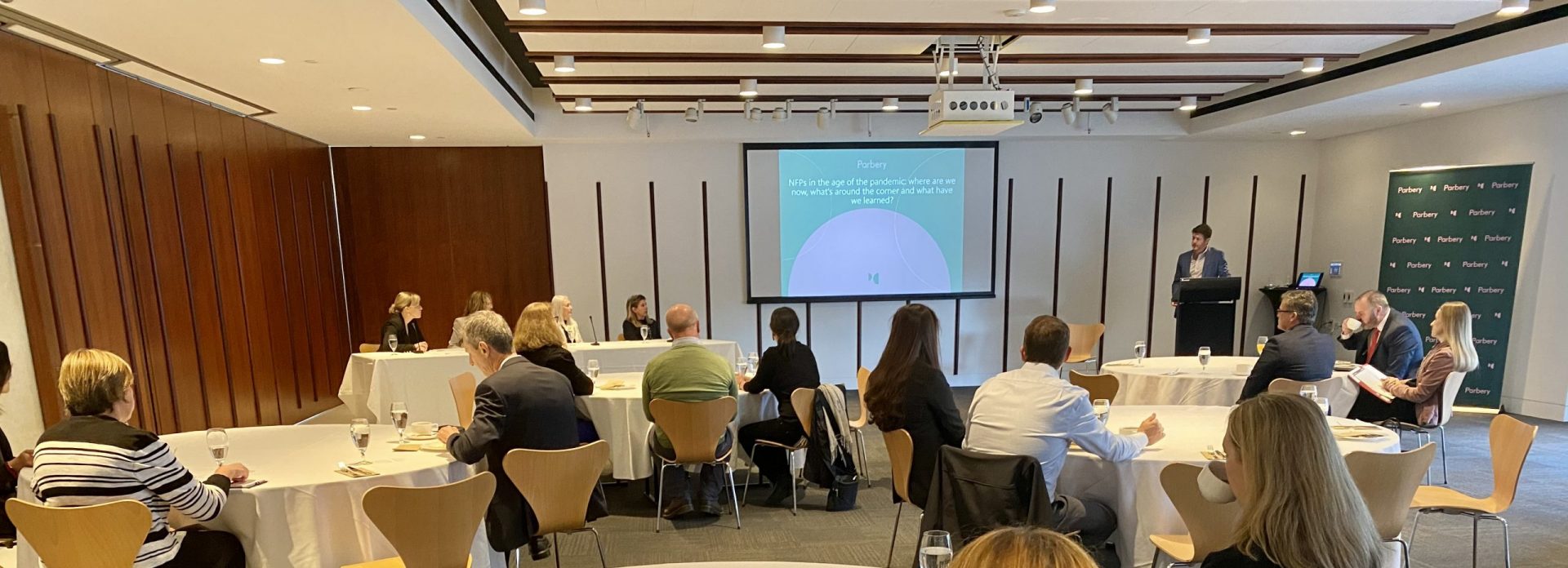What about a “care-led recovery”?

A care-led recovery, the capacity of For Purpose Organisations (FPOs) to quickly adapt and evolve in the face of multiple challenges and the need to remain energised and vocal were all positive themes coming from Parbery Consulting’s first forum focussed on the For Purpose sector.
The breakfast forum NFPs and the pandemic: where are we now, what is around the corner and what have we learned? was held on 28 October. More than 30 people working in and around FPOs gathered at the National Portrait Gallery to hear an esteemed panel of female leaders in the sector reflect on the challenges of the past 12 months and the outlook for the next 18 months. After more than six months of restrictions, changed working conditions and countless Teams or Zoom meetings, the audience embraced the opportunity to engage in person with other people encountering similar challenges and circumstances.
Reflecting on the changing circumstances facing her organisation, CEO of Communities@Work, Lee Maiden, shared her insights on the various impacts on the operations and business sustainability of her organisation. Communities@Work has a diverse portfolio of community services to deliver and a significant commitment to the delivery of early childhood education and care. Following the initial uncertainty that came with the onset of COVID-19 and local shut-downs, Lee was able to share how the organisation had, with the initial assistance from several government supplements and subsidies, continued to support the community and grow their service provision. Central to Communities@Work’s success was their ability to be agile as different parts of their organisation were impacted in different ways, particularly as government support measures were withdrawn.
Jean Giese, CEO of Volunteering ACT, highlighted that resilience is a key attribute of people who work or volunteer in the For Purpose sector. While it has been tested throughout 2020, Jean noted it was the resilience of people within the sector that enabled services to continue in changing circumstances and facing increasing demand. In the case of Volunteering ACT, more than 70% of all volunteers were stood down through the year, and with three to four volunteers for every employee of an FPO, they faced significant challenges to support their community. Jean said trust, flexibility, connection, culture and resilience were key in supporting staff and volunteers through the turbulent and rapid change experienced this past year.
Executive Director of Anglicare Australia, Kasy Chambers, delivered a salient point: for many people in the community who are supported by FPOs, COVID-19 is simply the next challenge they have to face. Many already have underlying health and economic pressures. Prior to COVID-19, it may have been bushfires or drought or a myriad of other influences that further impact their lives. Providing avenues for social mobility were key strengths of Anglicare Australia’s membership and the broader FPO community. The opportunity for a care-led recovery from the sector, suggested by Kasy, was embraced by the audience. However, it was noted that the sector will have to do the heavy lifting as public policy has not lent into this approach. Future uncertainty was centred on the flow-on impacts of changes to Newstart/Jobseeker rates, as well as the consequences of early access superannuation measures and relaxed lending practices.
Sam Page, CEO of Early Childhood Australia, encouraged a positive outlook for the sector, building on Kasy’s identification of a care-led recovery. Forced to rapidly evolve and adapt to continue to support their communities, FPOs have the foundation to continue to make an impact on the lives of significant portions of the community over the coming 18 months or more. Sam suggested there is an opportunity for FPOs to demonstrate leadership, drive impactful change and establish greater community value in their role and impact in society. Sam sees some unknowns that will have flow-on effects, including the impacts of low migration as an ‘Australian bubble’ is maintained, which amongst other things, might provide more employment opportunities for young people while leaving other areas in need.
As the conversation came to a close, the overwhelming sense in the room was that FPO leaders feel empowered by the possibilities of what they can achieve; feel connected to a community of committed, capable and inspiring professionals; and are prepared and equipped to succeed through the ongoing challenges to come. The optimism and enthusiasm to lead change that was reflected in the response of the audience was the perfect way to close Parbery’s first FPO forum.
Parbery Consulting is committed to supporting the FPO sector and its FPO services team is led by Brendan Egan and Annette Watson, who have extensive experience in executive roles in the sector. We know and understand what is important to your organisations and our motivation is to see you succeed in meeting your mission. Check out our dedicated FPO page for more information.


